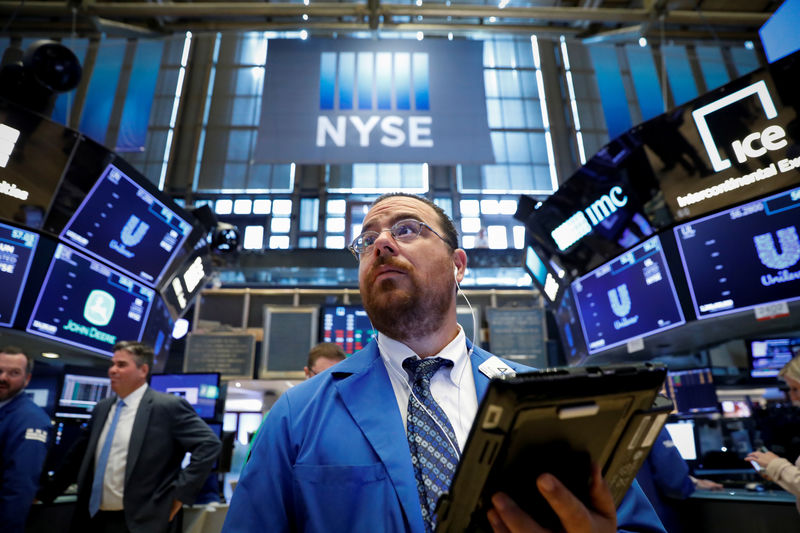 © Reuters.
© Reuters. By Geoffrey Smith
Investing.com — Donald Trump’s tax returns are leaked by the NYT; the TikTok ban is struck down by a Washington district court. Stocks are set to jump in what looks more like a correction than anything else; Uber (NYSE:) gets its London license back and the pound jumps as the last round of Brexit talks starts. What’s moving markets on Monday, September 28th.
1. Trump’s tax returns lack punch
The New York Times released an in-depth expose of President Donald Trump’s tax returns, which showed that he paid only $750 in income tax in the year he was elected.
The disclosures failed to disclose much in broad terms about Trump’s businesses that was not already known, but confirmed the general picture that he had used all of his TV income and more to cross-subsidize vanity projects such as his various golf courses.
It seems unlikely that that will do much to erode support among the President’s core voter base, even if it provides Democratic Party candidate Joe Biden with a useful line of attack in Tuesday’s first debate of the presidential election campaign.
2. TikTok ban struck down; Coney Barrett nominated to succeed RBG
Trump had a busy weekend in other respects too, nominating Amy Coney Barrett to fill the Supreme Court vacancy left by liberal champion Ruth Bader Ginsburg.
Coney Barrett, a federal judge and a staunch Roman Catholic who once served as clerk to the late Antonin Scalia, would widen the conservative majority in the Supreme Court to 6-3, if confirmed by the Republican-controlled Senate – as seems likely.
Elsewhere, a district court in Washington DC struck down Trump’s attempt to ban downloads of the Chinese lip-synching app TikTok. The Commerce Department still plans to render the app unusable in the U.S. from November 12, unless the U.S., China and the company’s owners can hammer out a compromise that satisfies all sides. The U.S. also unveiled fresh measures to restrict sales of sensitive equipment to Chinese chipmaker SMIC.
3. Stocks bounce hard in correction
U.S. stock markets are set to open sharply higher, helped partly by the lack of a killer punch in the NY Times’ tax disclosures but driven largely by what appeared to be bargain-hunting after four weeks of losses in the major indexes.
By 6:30 AM ET (1030 GMT), the contract was up 358 points, or 1.3%, while were up 1.7%.
There was little in the way of fundamental news to change the picture that has driven the last month’s losses. The Covid-19 virus continues to spread rapidly through the northern hemisphere with the onset of autumn, with France, the U.K. and other European countries all tightening local restrictions on gatherings.
Stocks likely to be in focus later include Uber, which regained its license to operate in London, one of its biggest markets outside the U.S., after a successful legal appeal. Also in the spotlight will be Caesars (NASDAQ:) Entertainment, whose $3.7 billion offer for U.K. bookmaker William Hill (OTC:) was lower than speculated on Friday.
4. First European exchange hits post-pandemic all-time high
William Hill was one of few losers in European markets in early trading, with most rebounding sharply after last week’s losses.
The modest Copenhagen market became the first European index to post an all-time high since the pandemic started, rising 1.1% to 1,349.46 points. Copenhagen’s index is notable for its concentration of renewable energy stocks, including wind farm operator Orsted (OTC:) and wind turbine maker Vestas Wind Systems AS (OTC:), which have ridden a wave of buying from ESG-themed investors this year.
The OMXC 20 also includes healthcare and biotech names such as Novo Nordisk (NYSE:), Novozymes (OTC:) and Coloplast A (OTC:), all of which have fared well against the backdrop of the pandemic.
At 9:45 AM ET (1345 GMT), ECB President Christine Lagarde will address the European parliament, while board member Isabel Schnabel is due to speak at a separate event.
5. Pound leaps on rate comments, Brexit talks
The pound rose to a three-week high against the and a 10-day high against the on renewed hopes of a deal to regulate the U.K.’s trading arrangements with the EU after its Brexit transition period expires at the end of the year.
Sterling had slid more than 3% since the start of the month on fears that the U.K. government was willing to accept a disorderly scenario of customs backlogs and a new hard border on the island of Ireland, a result of preferring sovereignty over local standards to frictionless trade with its biggest trade partner.
The pound was supported by comments from Bank of England Monetary Policy Council member Dave Ramsden playing down the prospect of negative rates in the near future.




0 Comments:
Post a Comment